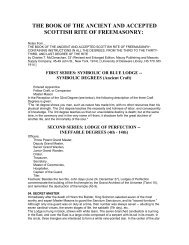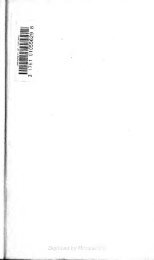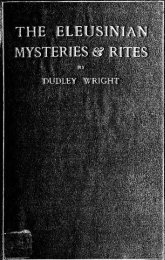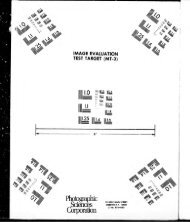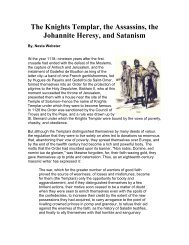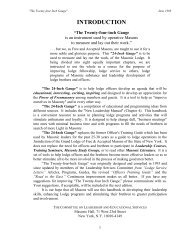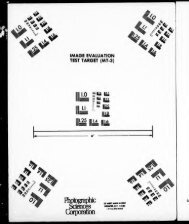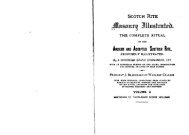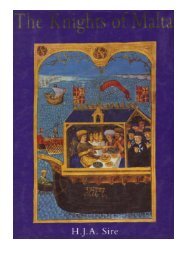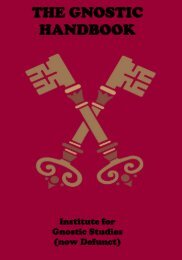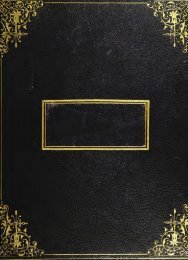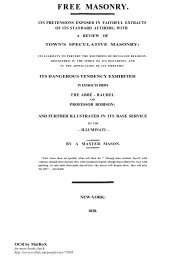The History of Initiation - The Masonic Trowel
The History of Initiation - The Masonic Trowel
The History of Initiation - The Masonic Trowel
You also want an ePaper? Increase the reach of your titles
YUMPU automatically turns print PDFs into web optimized ePapers that Google loves.
THE CELTIC MYSTERIES. 117<br />
countries, which were formed by the migration <strong>of</strong> the<br />
first descendants <strong>of</strong> Noah and his family. 18<br />
<strong>The</strong> Druids did not worship idols in the human shape,<br />
because they held that the divinity, being invisible,<br />
ought to be adored without being seen. But we are<br />
told that they did occasionally erect, like the primitive<br />
Buddhists <strong>of</strong> the east, 19 in retired places, statues <strong>of</strong><br />
Isis 20 or Ceridwen which must ; have been gigantic<br />
stones, 21<br />
rough as when taken from the quarry, 22 the<br />
Betulia <strong>of</strong> the eastern nations, 23 which are ritually con-<br />
secrated, and invested with peculiar and distinctive properties.<br />
<strong>The</strong>se stones, so highly venerated, 24 so enthu-<br />
siastically adored, were the representations <strong>of</strong> the great<br />
British deities, whose abundant merits have been so<br />
extravagantly eulogized by the bards. <strong>The</strong>se deities, by<br />
what variety <strong>of</strong> names soever they may have been designated,<br />
all melt into two, a male and a female, the great<br />
father and mother, 25 who were worshipped under the<br />
appellation <strong>of</strong> Hu and Ceridwen, and bore the same<br />
conspicuous character with the Egyptian Osiris and<br />
Isis ; the Grecian Bacchus and Rhea, or any other<br />
supreme god and goddess who represented the great<br />
father and mother <strong>of</strong> mankind in the mysteries <strong>of</strong> idolatrous<br />
antiquity.<br />
18 Vid. Mi 19<br />
1. i.<br />
supra, Fab. Pag. Idol., vol. ii., p. 340.<br />
20 <strong>The</strong> Scandinavians had a goddess <strong>of</strong> this name. (01. Rudbeck.<br />
Atlant., vol. ii., p. 212.)<br />
21 " Several <strong>of</strong> the idols <strong>of</strong> the old Arabs," says Sale, in his Pre-<br />
liminary Discourse to the Koran, "were no more than large, rude<br />
stones, the worship <strong>of</strong> which the posterity <strong>of</strong> Ishmael first intro-<br />
duced <strong>The</strong>se stones they at first only compassed out <strong>of</strong><br />
devotion ; but at last it ended in rank idolatry ; the Ishmaelites forgetting<br />
the religion left them by their father so far as to pay divine<br />
worship to any stone they met with." Captain Hamilton describes<br />
one <strong>of</strong> the idols in the Indian Temple <strong>of</strong> Jagun-nath, as being "a<br />
huge black stone <strong>of</strong> a pyramidal form ;" or, in other words, a stone<br />
pillar.<br />
22<br />
Bryant. Anal., vol. i., p. 13.<br />
"<br />
<strong>The</strong> mighty pile <strong>of</strong> magic planted rock<br />
Thus rang'd in mystic order, marks the place<br />
Where, but at times <strong>of</strong> holiest festival<br />
<strong>The</strong> Druid leads his train." MASON.<br />
24 Dr. Gordon informs us that the Irish peasants still pay these<br />
stones an awful respect. (Hutch. Cumb., vol. i., p. 243.)<br />
25 We find Pindar (Nem. Od. 6.) asserting the dignity <strong>of</strong> the great<br />
mother, where he says that all the gods as well as men sprang from<br />
her fruitful womb.



